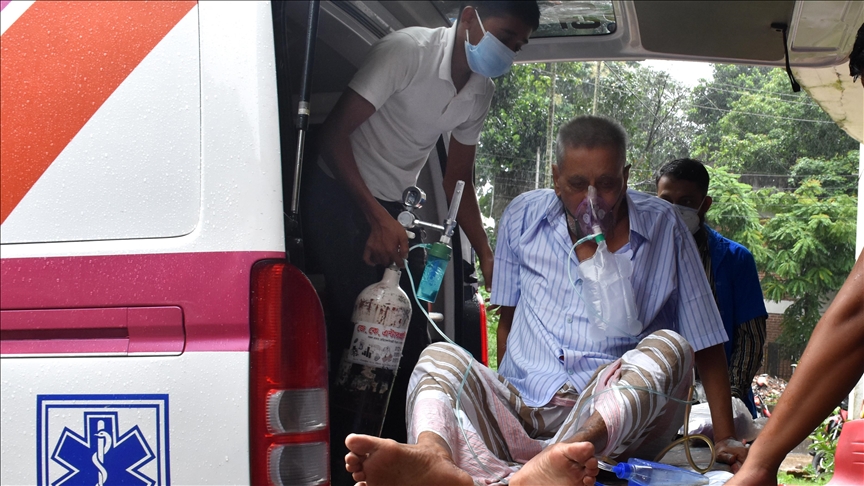Growing asbestos use causing deadly diseases in coastal Bangladesh
Asbestos sheets on house roofs used for collecting rainwater in salinity-hit villages cause cancer, say experts
 FILE PHOTO
FILE PHOTO
DHAKA, Bangladesh
People in villages along Bangladesh's coast impacted by saltwater intrusion are facing deadly diseases like cancer because of the growing use of asbestos sheets on the roofs of their homes for collecting rainwater.
Muhammad Nazmul Hasan, a resident of Chandmukhi village near the coastal town of Shyamnagar, lost his father, Abdul Sattar, who died in February after battling cancer for around nine months.
The doctor who treated his father at a local hospital said cancer had developed in Sattar's body and throat because he drank asbestos-contaminated water over a long period, Hasan told Anadolu Agency.
"We have been using asbestos sheets as a shed (roof) since 2010 as the growing salinity damaged tin sheds and other means (for collecting rainwater). We mostly rely on rainwater harvesting as nearby water sources have already been contaminated by growing salinity. We were using an asbestos shed in the process of harvesting rainwater," he said.
"We stopped using asbestos to harvest rainwater since my father died, but kept using asbestos sheets as a shed," he added, explaining that they kept the asbestos on the roof and walls due to its longevity.
Salinity is the amount of salt dissolved in water. Bangladesh, a country with a long coastline, is significantly impacted by saltwater intrusion. Severe salinity contamination in drinking water can cause health hazards such as hypertension and swollen arms and legs.
Saiful Islam of Shyamnagar told Anadolu Agency that most of the neighborhoods in his area use asbestos sheets on their roof and walls as a cheap and durable way to stave off the coastal salinity.
"People know its adverse impact on the human body but they ignore the consequences," he added.
Salinity forces use of deadly asbestos
Villagers say they have been living in the area for decades but never faced such a salinity crisis, triggered in part by climate change, to which they responded by switching their previous tin roofs to asbestos sheets.
Thousands of people dwelling in coastal regions have to use their roofs to collect rain for their drinking water, as the region is not suitable for ground wells due to the salinity of the groundwater sources and the costliness of filtering saltwater on a large scale.
Ali Azam Titu, a local elected official from the southwestern Gabura area, said that almost all homes except those with concrete roofs use asbestos as a building material.
"We don't have fresh water sources in our village. During the dry season, we live without any water source. Therefore, we rely on rainwater. But, the use of asbestos sheets as sheds contaminates rainwater in the collection process and we have started reporting a growing number of diseases linked to water contamination," he told Anadolu Agency.
According to the district public health engineering department, there is a significant degree of salt in the region's water sources, with 4,400 milligrams per liter compared to the accepted threshold of 1,000 mg/L in the coastal Satkhira district.
Due to the cost of a single reverse osmosis water purification system -- 3 million Bangladeshi Taka (approximately $32,000) --, officials have continued to recommend rainwater harvesting.
Frequent cyclones and weak embankments have caused saline water to enter the area, contaminating freshwater sources and becoming a major concern for the region, said Titu.
Asbestos causes grave health problems
Public health expert Lelin Chowdhury told Anadolu Agency that asbestos can enter the human body through water consumption or inhaling its particles. It can cause cancer, occupational diseases, and asbestosis, a lung disease caused by breathing in particles of the substance.
"Asbestos is mainly used in industries, but its use in households or as sheds is illegal. Asbestos can also be inhaled and attack the lungs, stomach, liver, and kidneys and cause diseases, including cancer by contaminating the metabolism process over a long period," said Chowdhury.
"Studies in hospitals say cancer is spreading fast in rural areas, which was earlier mostly found in major cities. We need to stop asbestos use in households and build awareness to protect the coastal people," he warned.
Md. Shahidul Islam, an officer with the Satkhira District Public Health Engineering Department, told Anadolu Agency that they did not supply asbestos sheets for rainwater harvesting.
Islam claimed that almost 58% of fresh drinking water demand is met under a government arrangement in Shyamnagar.
"We have started implementing a project in which we install rainwater harvesting tanks in households. We thoroughly examine all the materials in person in the beneficiaries' houses before installing a rainwater harvesting tank.
"But, we cannot go house-to-house out of our project and check those who are using asbestos. However, we informed the local member of parliament that people must not use asbestos," he said.
Anadolu Agency website contains only a portion of the news stories offered to subscribers in the AA News Broadcasting System (HAS), and in summarized form. Please contact us for subscription options.







